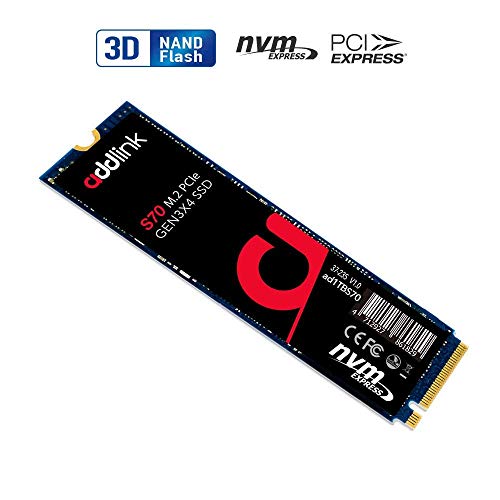- Features
- Description
- Similar Items
【Capacity】1TB NVMe SSD- Perfect upgrade for your new gaming build *Performance may vary based on system hardware & configuration
【Speed Technology】3D NAND technology Sequential Read Speeds up to 3400 MB/s; Write Speeds up to 3000 MB/s : low latency, reliability and power efficiency
【Form Factor】M.2 2280 PCIe 3.0 x4 NVMe SSD
【Great reliability】Engineered with RAID engine and LDPC (Low-Density Parity Check) coding, a powerful ECC algorithm to keep your data secure ; comes with 5-year limited warranty
【Compatibility】 Windows 10 and 8.1 systems provide native support to PCIe NVMe SSDs.
【Speed Technology】3D NAND technology Sequential Read Speeds up to 3400 MB/s; Write Speeds up to 3000 MB/s : low latency, reliability and power efficiency
【Form Factor】M.2 2280 PCIe 3.0 x4 NVMe SSD
【Great reliability】Engineered with RAID engine and LDPC (Low-Density Parity Check) coding, a powerful ECC algorithm to keep your data secure ; comes with 5-year limited warranty
【Compatibility】 Windows 10 and 8.1 systems provide native support to PCIe NVMe SSDs.
Binding:
Personal ComputersBrand:
AddlinkEAN:
4712927861836Label:
AddlinkManufacturer:
AddlinkModel:
8541578384Size:
1TBWarranty:
addlink's S70 M.2 PCIe SSD is powered by the latest 3D NAND technology and PCIe Gen3x4 NVMe interface, with four lanes are used for transmitting and receiving data simultaneously, resulting in compelling performance of up to 3400MB/s read and 3000MB/s write for 1TB capacity. For professional use, S70 SSD aims at high-end applications, such as photo/video editing, 3D animation and rendering, gaming, and other intensive applications, which require constant processing heavy workloads with no system lags or slowdowns of any kind. Powered by 3D NAND flash memory, the S70 gives you not only fast transfer speeds but unmatched reliability.Better endurance, higher reliability. S70 M.2 SSD is engineered with a RAID engine and LDPC (Low-Density Parity Check) coding, a powerful ECC algorithm, to keep data secure. Manufactured with high-quality flash chips, and engineered dynamic thermal throttling mechanism, the S70 guarantees superior endurance and stability for high-end applications. *Actual performance varies by capacities, host device, user applications, and other factors.






